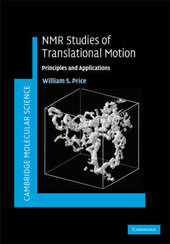
|
NMR Studies of Translational Motion: Principles and Applications
Hardback
Main Details
| Title |
NMR Studies of Translational Motion: Principles and Applications
|
| Authors and Contributors |
By (author) William S. Price
|
| Series | Cambridge Molecular Science |
|---|
| Physical Properties |
| Format:Hardback | | Pages:416 | | Dimensions(mm): Height 253,Width 180 |
|
| ISBN/Barcode |
9780521806961
|
| Classifications | Dewey:530.41 |
|---|
| Audience | | Professional & Vocational | |
|---|
| Illustrations |
3 Halftones, unspecified
|
|
Publishing Details |
| Publisher |
Cambridge University Press
|
| Imprint |
Cambridge University Press
|
| Publication Date |
30 July 2009 |
| Publication Country |
United Kingdom
|
Description
Translational motion in solution, either diffusion or fluid flow, is at the heart of chemical and biochemical reactivity. Nuclear Magnetic Resonance (NMR) provides a powerful non-invasive technique for studying the phenomena using magnetic field gradient methods. Describing the physical basis of measurement techniques, with particular emphasis on diffusion, balancing theory with experimental observations and assuming little mathematical knowledge, this is a strong, yet accessible, introduction to the field. A detailed discussion of magnetic field gradient methods applied to Magnetic Resonance Imaging (MRI) is included, alongside extensive referencing throughout, providing a timely, definitive book to the subject, ideal for researchers in the fields of physics, chemistry and biology.
Author Biography
William S. Price is Professor and Chair of Nanotechnology and leads the Nanoscale Organisation and Dynamics Group, University of Western Sydney. Professor Price is an expert in the theory, development and application of NMR spectroscopy focussing on NMR diffusion measurements and magnetic resonance imaging (MRI) techniques for studying molecular association and molecular dynamics.
Reviews'This long awaited monograph is finally in print. It provides an in depth coverage of the subject area, together with like 1000 references to the literature in this very rapidly expanding branch of science - highly relevant to chemistry, physics, medicine, engineering sciences and others. It is a pleasure to read, and the author is to be congratulated on a text that will become a standard citation in the scientific literature for many years to come.' Peter Stilbs, Royal Institute of Technology (KTH) in Stockholm
|